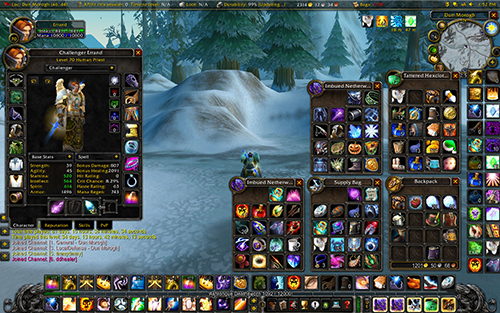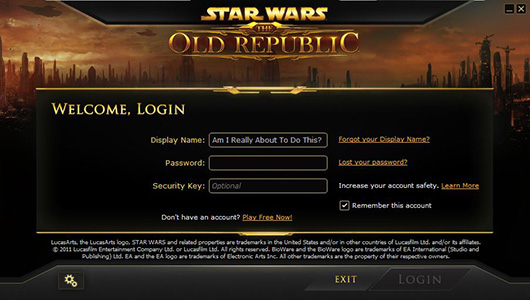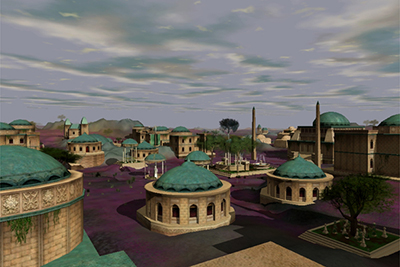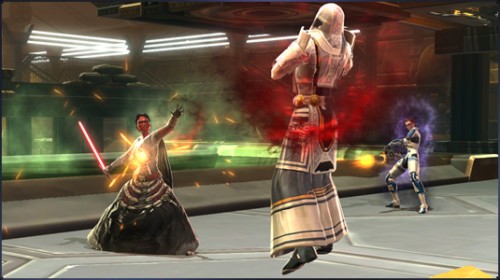I was sitting at my desk, upright, back straightened so as to alleviate any symptoms of my old spinal injury. It was a warm night, close, humid, and as I ran my fingers back through my hair I felt the beads of lightly-formed sweat dampen the strands. My computer, sat upon the desk to the left, was humming a little louder than usual, as the audible CPU cooler fanned and spewed what heat it could capture through the nearby ventilation holes on the side of the case. I looked over at the clock in the lower right corner of the screen. 19:37. A moment later I realised I had been staring at the static screen contents for nearly five minutes, the ‘Install’ dialog box displayed, mouse pointer hovering upon it. What kind of game would cause one to lose five minutes of time agonising over the decision to install or not? What kind of game, but an MMORPG?
This week I reinstalled and bought 60 days of game time for The Old Republic, and just like with the opening paragraph of this piece, the premise was more interesting than the reality. My thoughts on the current state of SWTOR are kind of all over the place, but it may help you to understand where I’m coming from if I briefly explain my history with MMORPGs.
I am not a WoW guy – never have been. I realise how odd it is to read someone’s words regarding MMOs and have that statement be a part of them, but that’s truly the case with me. I got my first taste of MMOs with Star Wars Galaxies in 2003. By modern standards it was a mess of a game, perhaps even by the standards of its day, but it was unconventionally unique. A lot can be – and has been – thrown at SWG and its reputation, but nobody can objectively claim it wasn’t trying to be different to its peers (which at the time were Everquest, Anarchy Online, Lineage 2, and a couple of other lesser known ancestors of the genre). This was a game with so much player freedom that every planet was designed in a way that incorporated canonical cities, spaceports, and points of interest, but was also so spacious that players could drop houses anywhere. Once a house is dropped, someone else can drop a house, then someone else, then several more players. Eventually someone would invest skill points in the Politician skill tree and build a City Hall, then upgrade it to build a Guild Hall, a bunch of player-run shops, and eventually a shuttleport to tap into the planet’s travel network. I’ve inadvertently gone off on a bit of a SWG defence rant here, but to cut that rant short I will simply say that this was my WoW. SWG was special to me, and still is to this day (and to many others, see swgemu.com), but it wasn’t the only MMO I played.
About a year into my SWG addiction, Everquest 2 was released. And I jumped in hard. Again though, it wasn’t the only one. During those years I beta tested almost every upcoming MMO, and bought many of them upon release (incidentally, the beta test experience with WoW is why I never picked it up). At one point I had active subscriptions to SWG (four accounts at £10 per month each), Everquest 2, RF Online, Final Fantasy XI, Dungeons & Dragons Online and City of Heroes. Sounds expensive, right? It was. And I certainly didn’t have the time to invest £10 per game per month’s worth of effort into them. It was around the time of SWG‘s second mechanics overhaul, the dreaded NGE (New Game Experience), that I had my moment of clarity, my epiphany.
If you’ve ever played multiple MMOs for a decent stretch of time, you know what I’m talking about. It’s that moment when you realise that no matter what the setting is, no matter what all the side dressing looks like, every MMO is functionally the same. You create your character, get an insulting fetch or ‘Kill X Ys’ quest, alternate between pressing Tab and a couple of other number keys to kill a thing, return to the entity with a symbol floating on top of it, right-click and receive a new bit of gear and enough experience points to make some endorphin-producing colourful text flash around on the screen. Then there are the thirty million abilities you’ll unlock that really could have been distilled down to less than ten, twenty at a push. And of course there’s the oversized environments combined with the tortoise-crawl running speed, designed to make you spend more time in the game simply because it takes a long time to get from A to B. And if you level up enough you’ll unlock an ability that lets you run slightly faster! And if you spend a bunch of currency you can buy a mount that lets you move faster still! It’s manipulative, insulting, utterly disgusting design.
I could go on and on about the harmful tropes that MMOs employ, but I don’t want that to be the focus of this article, because the truth is my experience allows me to understand why people don’t share this sentiment with me, or maybe they do but it doesn’t stop them playing these games. After all, I spent years ignoring the obvious in favour of relishing the few things about each game I liked.
I’ve spent a lot of time on the Big Red Barrelcast this year expressing my dissatisfaction with Destiny, which is not strictly speaking an MMO, but certainly borrows the more antagonistic design philosophies of the genre. I also found myself unable to enjoy the much-adored Dragon Age Inquisition, despite liking the setting a lot, because its enormous maps, relatively slow movement speed, quest-givers ten minutes running distance from their objectives, and painfully simple combat mechanics gave me borderline PTSD flashbacks (hyperbole) to my darkest time with MMOs.

Half of your time spent in MMORPGs is dedicated to learning the myriad abilities that are thrown at you en masse. Most of which aren’t strictly necessary.
Here’s the thing: I don’t think these games are bad. Far from it. But the manipulative mechanics that exist solely to prey on players’ [often valuable] time have been something I’ve suffered through for far too long, costing me far too much money, across a multitude of games spanning a decade. And this is also why I realise I am very much the outlier, because most people playing these games today have not been through that. If someone has been playing WoW for ten years it’s because they love the world and that’s where some of their best gaming moments have been had. If someone is still playing Destiny almost one year on, it’s likely because the aesthetic appeals to them, and the combat is more satisfying than most of the shooters out there. And across both of these games and more, there’s the sense of personalisation and ownership of your character and their gear and skills. These are powerful aspects of the core design that deliberately obfuscate the dark happenings behind the scenes, but unless you’ve been there and done that several times over several years, it’s not going to offend you all that much. In fact it’s justifiably ignorable.
The bottom line is that as much as I like a lot about many of these games, and I want to play them, I’m at the age and level of experience now in which my time has become the deciding factor in whether I choose to play or not. I am no longer the kind of person that finds one solid game and plays it for a year. I need fast-paced gratification from the games I play, and I need to be able to see an end point so I can move on to whatever game is next.
“Kev, if this extremely lengthy diatribe is in any way accurate, why then did you opt to reinstall and play a MMORPG again?”
I hope that if I made one point clear so far, it’s that my biggest hurdle, in spite of everything else I dislike about the genre, is the required time investment. And this is where I finally get back on track and tell you why I’m playing SWTOR again. I’m even going to give the reason its own line.
Subscribers now get a 12x experience buff for class missions that allow the player to get through the best part of the game — the class stories — in less than twenty hours if you’re learning the game, and less than eight if you know your way around the systems.
This single modification to the game has addressed my biggest complaint with the genre, and that’s why I’ve reinstalled it. To be clear, there are still a list of things I dislike about the game, and honestly I kind of hate ‘playing’ it what with the combat mostly distilling down to ‘smash the 3 key four times, then smash 2, then back to three until closest target is dead. Move two steps forward and repeat for next target.’ (Say what you like about Destiny, but at least its combat wasn’t that reductive).
I’m enjoying playing through the Sith Inquisitor story a lot. It’s one of the few I never started in my initial month with the game. The stories I played at that time for numerous hours were abandoned as soon as the XP curve started looking more like a horizontal line than a vertical one (with Time(x) and Progression(y), obviously), and with this new modifier I may even go back to those characters to play those stories through to completion too.
The time investment of ~8 hours per storyline sounds like a lot of time, and it is, but at least there’s consistent progression throughout and there’s an endpoint in sight. I don’t mind long games, but I lament games that do not respect the time I invest. SWTOR is finally at a point now where it at least halfheartedly respects my time.
I’ll be posting a video in the near-future showing the game as it exists today, reiterating on some of the positives and explaining where it still falls flat.







